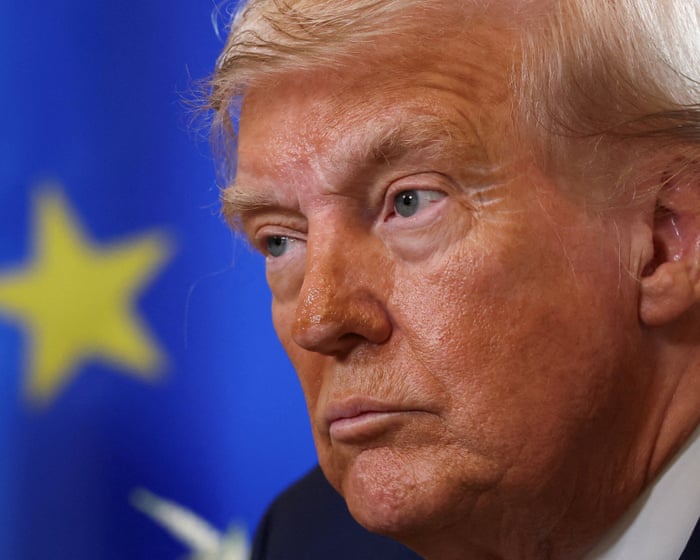Will Brussels ever challenge Donald Trump and US tech giants? The current inaction is more than a legal or economic failure—it’s a moral one. It calls into question the very core of Europe’s democratic identity. The issue isn’t just about the future of companies like Google or Meta, but the principle that Europe has the right to regulate its digital space under its own laws. If the EU can’t enforce its own rules, it risks becoming subordinate to Washington and Silicon Valley, with Trump acting as its master.
To understand how we reached this point, let’s look back. In late July, the European Commission agreed to a humiliating deal with Trump, accepting a permanent 15% tariff on EU exports to the US without gaining anything in return. The situation was made worse by the commission also committing to invest over $1 trillion in US energy and military purchases. This agreement revealed Europe’s fragile reliance on the US. Less than a month later, Trump threatened severe new tariffs if Europe enforced its laws against American tech companies on its own territory.
For years, Brussels has argued that its market of 450 million affluent consumers gives it undeniable leverage in trade talks. Yet, in the six weeks since Trump’s threat, Europe has taken almost no action. There have been no retaliatory steps, nor any use of the new anti-coercion tool—the so-called “trade bazooka” that was supposed to be Europe’s ultimate defense against external pressure. Instead, we’ve seen polite statements and a fine on Google amounting to less than 1% of its annual revenue for long-standing anti-competitive practices, already established in US courts, which allowed it to exploit its dominant position in Europe’s advertising market.
Under Trump’s leadership, the US has made its goals clear: it no longer aims to support European democracy but to weaken it. A recent essay on the US Department of State’s Substack, written in the same alarmist and exaggerated tone as Viktor Orbán’s speeches, accused Europe of waging “an aggressive campaign against Western civilization itself.” It criticized alleged restrictions on authoritarian parties within the EU, such as Germany’s AfD and Poland’s PiS.
So, what can be done? Europe’s anti-coercion mechanism works by assessing the level of coercion and implementing countermeasures. If most European governments agree, the European Commission could ban US goods and services from the European market, impose tariffs, revoke intellectual property rights, block investments, or demand reparations as a condition for re-entry.
This tool isn’t just about economic retaliation; it’s a statement of political resolve. It was created to show that Europe would not accept foreign coercion. But now, when it’s most needed, it remains unused. It’s not a bazooka; it’s a paperweight. In the lead-up to the EU-US trade deal, many European governments talked tough publicly but didn’t push to activate the instrument. Others, like Ireland and Italy, openly advocated for a more lenient approach.
A softer stance is the last thing Europe needs. It must enforce its laws, even when it’s difficult. Alongside using the anti-coercion tool, Europe should suspend social media algorithms that recommend unsolicited content until they are proven safe for democracy. Citizens, not algorithms controlled by foreign interests, should have the freedom to choose what they see and share online.
Trump is pressuring Europe to dilute its digital regulations. But now, more than ever, Europe must hold large US tech firms accountable for anti-competitive behavior, spying on Europeans, and exploiting children. Brussels must also ensure that Ireland enforces Europe’s digital rules on US companies. However, enforcement alone isn’t sufficient.Europe must gradually replace all major tech platforms and cloud services from outside the EU with its own alternatives over the next ten years.
The real risk at this moment is that if Europe fails to act now, it may never do so again. The longer it delays, the more its self-confidence will erode. It will increasingly believe that resistance is pointless, that its laws are not enforceable, its institutions lack sovereignty, and its democracy is not truly self-governing. Once that mindset takes hold, the slide toward authoritarianism becomes unavoidable, fueled by algorithmic manipulation on social media and the normalization of falsehoods. If Europe continues to shrink back, it will be pulled into that same downward spiral. Europe must take action now, not only to stand up to Trump but to carve out a space where it can exist as a free and sovereign entity.
In doing so, Europe must set an example that the rest of the world can look to. Democracies in Canada, South Korea, and Japan are watching closely. They are questioning whether the EU, the last stronghold of liberal multilateralism, will resist foreign pressure or give in to it. They are asking if democratic institutions can endure when the world’s most powerful democracy abandons them. They also see the example of Lula in Brazil, who confronted Trump and showed that the way to deal with a bully is to strike back forcefully.
But if Europe hesitates, if it continues to issue polite statements, impose symbolic fines, and simply hope for a better future, it will have already lost.
Johnny Ryan is director of Enforce, a unit of the Irish Council for Civil Liberties.
Frequently Asked Questions
Of course Here is a list of FAQs about the topic The EU possesses a hidden strategy to combat Trumps economic intimidation Now is the moment to put it into action based on the perspective of Johnny Ryan
BeginnerLevel Questions
1 What is this hidden strategy the EU has
The hidden strategy isnt a secret weapon but rather the EUs established unified single market The idea is that by acting as one large economic bloc the EU can use its collective power to resist pressure from larger countries like the US
2 What is economic intimidation
Economic intimidation is when one country uses threats of tariffs sanctions or other trade barriers to force another country to change its policies or gain a competitive advantage
3 Why is this strategy considered hidden
Its called hidden because the EUs single market is an everyday reality not a new military or digital tool Its power as a defensive economic weapon is often overlooked until a crisis like a trade war happens
4 What does put it into action actually mean
It means the EU should proactively use its regulatory and market powerfor example by setting global standards imposing its own tariffs or blocking mergersto protect its interests and counter unfair US trade policies
5 Who is Johnny Ryan
Johnny Ryan is a Senior Fellow at the Irish Council for Civil Liberties and a wellknown expert on digital policy and the power of large tech platforms often commenting on the intersection of technology regulation and geopolitics
Advanced Strategic Questions
6 How exactly can the EUs single market be used as a weapon
The EU can leverage its market of 450 million consumers by making access conditional For instance it can enforce its strict data privacy rules environmental standards or competition laws Any company including American ones must comply to do business in the EU effectively allowing the EU to set global rules
7 What specific tools does the EU have to counter US tariffs
The EU can respond with its own rebalancing tariffs on iconic American products file cases with the World Trade Organization or use its antitrust authority to investigate and fine dominant US companies



